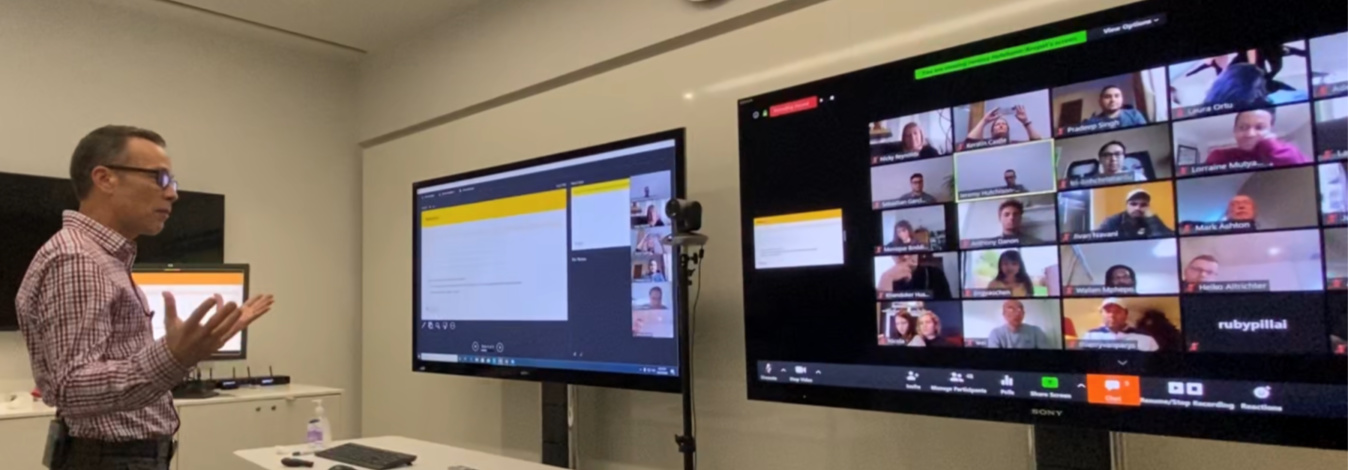
Continuing the Masters in Entrepreneurship during a pandemic
COVID-19 has developed into a global crisis affecting people’s health and impacting on businesses and education. The Masters in Entrepreneurship at Cambridge Judge Business School adjusted its “residential” week to online delivery due to the coronavirus pandemic. Important lessons were learned that will outlive the current crisis.
The Masters in Entrepreneurship is a two-year, part-time programme that has students from 35 countries who are either launching a startup from the ground up or growing their existing businesses. It was always designed as a “blended” programme in which four “residential” weeks in Cambridge over those two years are combined with the bulk of learning online.
Like all organisations, we hoped this would continue uninterrupted despite the news emerging from China at the end of January of a dangerous virus. But we prepared well for unanticipated developments, and we believe that so far this has paid off well and taught us valuable lessons for the future.
Preparations before the global spread
As the news emerged from the city of Wuhan, we started putting preparations in place in case our Chinese students would be impacted and unable to attend the residential week planned in March. Initially, we intended to deliver lectures to a physical audience at Cambridge Judge Business School and simultaneously live-stream the lectures to our students unable to be present in person.
However by the time the residential week arrived, other countries had imposed travel restrictions, making it impossible for many more of our students to attend – and just two days before the residential it became impossible to hold even small gatherings at Cambridge Judge Business School.
This was of course disappointing. The residential weeks are a much-loved feature of the programme because students can come together to learn, practice and exchange ideas. It is a special time for students to meet face to face while attending lectures, workshops and seminars, and to learn from each other through in-depth discussions.
Plan B
Yet our preparations worked to deliver a successful week online. The Audio Visual and Digital Learning Teams at Cambridge Judge Business School worked together to create a pop-up studio dedicated to our programme, equipped with screens and video cameras. This was an extraordinary effort pulling together many resources.
As our students logged in on the first day of the now virtual residential, they were greeted by the director of the programme Dr Jeremy Hutchison-Krupat. Despite everybody’s greatly varying circumstances, almost all students managed to join this session.
The technology worked amazingly. Slowly at first and then with increasing frequency, the students participated in the lectures through questions and comments. Virtual break-out sessions were held in which students were divided into small groups to discuss a challenge they were given by the lecturer. Students presented their thoughts and partook in polls.
Old timetable out – new sessions in
As the residential drew near, it became apparent that our students were urgently seeking information that would address their immediate concerns. When some faculty became unable to deliver the regularly scheduled lectures, it gave us the opportunity to fill the open slots with new, relevant content.
Out went organisation and management lessons, in came lectures on supply chain management and risk assessment and management. The Dean of Cambridge Judge Business School, Christoph Loch, stepped in to hold a lecture on Managing Unknown Unknowns.
Lectures from afar
Flight restrictions and social distancing affected not only our students but also lecturers, mentors and contributors who were now stuck in various countries across the world. Dr Stephanos Capsaskis presented from his home country of Greece, engaging our students with his thoughts and knowledge on raising VC finance. All of our seminar speakers, who are experienced entrepreneurs in their industry presented from their homes.
Pitch events online
During a normal residential week, our students would gather mid-week for a pitch event. The pitch event allows students to practice presenting their venture, to ask for investment, support or to find essential talents.
By Wednesday, nothing could stop our technology embracing students. The pitch event was held online, questions asked, solutions offered, and feedback provided.
So what did we learn?
Thinking back now on the “online residential” week, we don’t think that term is as much an oxymoron as it might initially sound. People weren’t physically together, but a different spirit of community quickly emerged.
Being able to adjust to the new situation quickly showed our students that we don’t just preach but live by what we teach at CJBS. Whilst businesses the world over scrambled for answers, we taught our students to make sure to consider the right questions first. We provided calm and reassurance and introduced our students to critical new frameworks to navigate the unusual situation.
The lecture by Prof Daniel Ralph, for example, showed that assessing risk is not an easy task for anyone and that many large companies had in the past been caught out by a lack of preparing for significant risks appropriately. He put the idea of resilience into an entirely different light by showing that resilience could be achieved by planning not through mental toughness.
Working together
Maybe the most important lesson that our students gained from the unusual residential week was that we are all better off working together.
With the help of technology, we are now connected more closely than ever. The residential week encouraged some individuals who were initially reluctant to engage in online gatherings and converted them to fully-fledged technophiles.
The effects of the coronavirus on the world economy have only just begun. But our cohort has grown closer despite the physical distance. We hope that in the coming months and years, our students will reach out to us and to each other to seek answers to their questions and find ways forward whatever the circumstances.


Leave a Reply